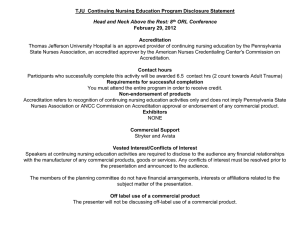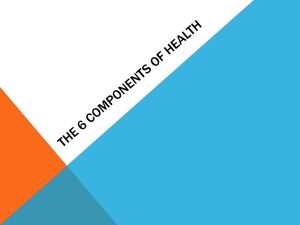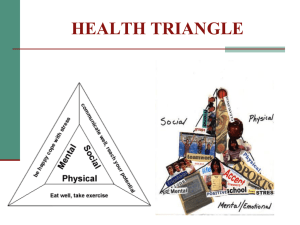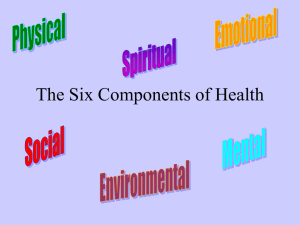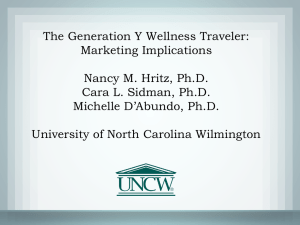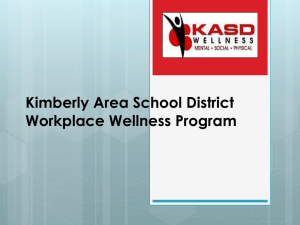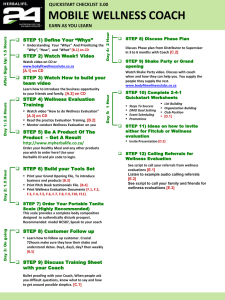Nenqayni Wellness Centre Society
advertisement
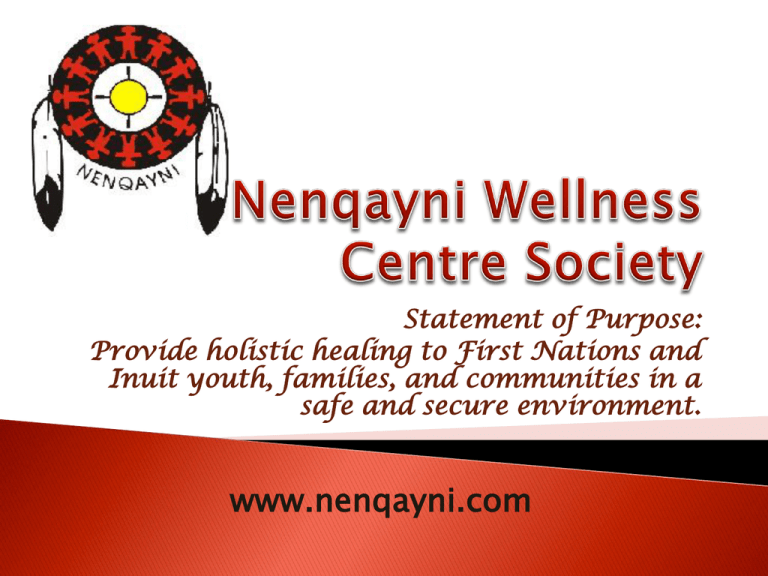
Statement of Purpose: Provide holistic healing to First Nations and Inuit youth, families, and communities in a safe and secure environment. www.nenqayni.com 1. 2. 3. A Brief History Treatment Centre Governance, Operations, and Service Delivery Nenqayni Programs Family Alcohol and Drug Program (FADP) Youth and Family Inhalant Program (YFIP) Nenqayni Community Mobile Program 4. 5. Continuing Care Program Accreditation The Nenqayni Wellness Centre began treatment services in 1981 after several years of struggle and hard work by many concerned people of the Cariboo-Chilcotin. Nenqayni first provided services out of the old residential school (St. Joseph’s Mission), moving to the Slumber Lodge Motel and finally moving to its own newly built facility on the Deep Creek reserve. In July 1996 Nenqayni was one of the first youth treatment programs nationally to admit youth clients into the new Youth & Family Inhalant Program. Originally located in modular trailers, the Youth Program moved to a new building in 2002. In subsequent years, a full size gym, a new daycare and family program school (2008) named the Antoine Archie Education Centre were built greatly enhancing the services available to clients in both programs. Nenqayni is a non-profit society owned by the 15 bands and 3 Nations in the Cariboo Chilcotin Nenqayni’s Board of Directors is comprised of 2 representatives from each Nation 6 Tsilhqot'in (Chilcotin) Nations ◦ Toosey, Nemiah Valley, Stoney, Red Stone, Anaham, Alexandria 5 Secwepemc (Shuswap) Nations ◦ Alkali Lake, Soda Creek, Williams Lake, Canoe Creek/Dog Creek, Camin Lake 4 Dakelh (Carrier) Nations ◦ Kluskus, Redbluff, Nazko, Ulkatcho ◦ See Map of our service area Association of British Columbia First Nations Treatment Programs ◦ Mission: “To provide a First Nations forum that promotes culturally relevant best practices to enhance, excel and advance the continuum of care in addressing addictions” Clinical staff are certified by the Canadian Council of Professional Certification and receive ongoing training relating to their positions and as required by accreditation and licensing. All staff must: meet minimum training requirements, have 3 years sober living, clean criminal record check, drivers abstract check, ethics and confidentiality requirements. All of Nenqayni’s staff receive regular training in the following areas: 1. 2. 3. 4. 5. 6. 7. 8. 9. Medication Administration Self Harm Awareness and Intervention Applied Suicide Intervention Skills Non-Violent Crisis Intervention Data and Outcome Collection Aboriginal/Cross Cultural Awareness First Aid Current Mental Health Resiliency AND MUCH, MUCH MORE! All clients attending Nenqayni’s residential programs must complete an intake package. Intake packages can be found on the Nenqayni website (www.nenqayni.com) or by contacting Nenqayni (250-989-0301) and speaking to our intake coordinators. ◦ Youth Program: Sharon Duffy ext. 223 ◦ Family Program: Joan Evans ext. 206 Most treatment centers require similar basic requirements for clients to be eligible for intake. These include: ◦ ◦ ◦ ◦ Medical screening 6 counseling sessions Tuberculosis test Detox completed (if required) Nenqayni provides lunch and dinner Monday – Friday Youth and family programs and staff eat together Nenqayni believes that First Nations traditions and culture are important parts of healing for First Nations people. Nenqayni is participating as both a NNADAP Centre and YSAC Centre in the “Culture as Interventions Research Project” (CasI) www.tinyurl.com/cultureasintervention (1) (2) (3) (4) (5) (6) to improve and promote the health of First Nations who problematically use substances through innovative health intervention research; to document and generate knowledge on indicators of the impact of Indigenous cultural interventions on client wellness; to design a culturally valid instrument to measure change in client wellness; to disseminate the research findings and implement knowledge translation strategies within the national NNADAP and YSAP treatment system, and specifically inform the development of the national addictions data management system; to provide a successful model of collaborative Indigenous health intervention research that is rooted in research being conducted by, for, and in balance with First Nations health stakeholders; and to facilitate mentoring opportunities among the diversity of partners involved in the study. Staff and clients begin the day with drumming and sage and prayer. Staff and clients participate in sweats, pipe ceremonies, drum making, medicine gathering, drumming and singing. Consistently, feedback from clients reports cultural and ceremonial activities as some of the most beneficial and enjoyable activities at the centre. Both the Family Program and Youth Program enjoy a variety of outings and activities: AA and NA Round Ups Powwows Crafts – beading, finger painting, rattles Medicine Gathering and Sage Picking Swimming, Bowling, Hiking, Historical Sites Nenqayni family program is a NNADAP treatment centre. NNADAP is the primary network in place to respond to First Nations substance use issues. 49 NNADAP alcohol and drug abuse treatment centres across Canada NNADAP Renewal Framework: http://nnadaprenewal.ca/wpcontent/uploads/2012/01/Honouring-OurStrengths-2011_Eng1.pdf Cohesive Groups ◦ Single mothers, dual parents Program is dynamic and fluid ◦ Groups needs determine what is presented All themes of programming carry throughout Group sessions act in conjunction with afternoon and weekend workshops and activities Full time youth counselor for children in the families 2 full time elders Male and female counselors for group sessions and individual sessions Coaching staff to facilitate workshops and activities Stages of Change Parenting Medicine Wheel – Balance Communication Anger Management Grief and Loss Family/Domestic Violence Historical Trauma Sexual Health Nenqayni gymnasium Nenqayni cardio and weight room Nenqayni provides daycare for children newborn to 4 yrs old. Nenqayni also provides evening babysitting during adult program time. How to be a sober family Codependence Feelings of guilt or abandonment Feelings of jealousy and mistrust Restructuring the family dynamic Forming familial attachments Nenqayni belongs to a national committee of youth treatment centers from across Canada called YSAC (www.ysac.info) Vision: “Delivering pro active, social, cultural and evidenced based programs that empower Indigenous families and communities to improve their quality of life.” To strengthen our Indigenous Recovery Network of substance abuse Treatment Centres for youth, their families and communities; To provide services based on indigenous principles and values; To utilize and respect the natural value of culturally based programming; To develop and share Best Practice initiatives with members and partner organizations, nationally and internationally; To ensure a national perspective is considered in conjunction with attention to and respect for regional and centre based priorities and projects. The Youth Program has 3 intakes per year. They occur in January, mid May and late August. Each treatment cycle is approximately four months in length. Although the youth program is called an “Inhalant Program”, Nenqayni accepts youth from all over Canada who struggle with substance abuse and/or substance abuse affected life styles – not only inhalants. The youth program includes school, education sessions, group sessions, individual counseling, a focus on fitness, nutrition awareness. Cultural activities such as daily smudging, sweats, and drumming and singing. Youth also enjoy hand crafts and art activities such as beading, painting, sewing, etc. Self Esteem Emotional Intelligence Medicine Wheel – Balance Communication Bullying Anger Management Grief and Loss Family/Domestic Violence Historical Trauma Sexual Health Drug of abuse info sessions: crystal meth, cocaine, marijuana, crack AND SO MUCH MORE! Began in the fall of 2012 Funding from the Interior Health Authority, First Nations Health Authority and Health Canada Delivers “mobile” (i.e. outreach or day programming) to the 15 bands that own and govern Nenqayni Wellness Centre. 3 week long programs delivered at the community level that are designed to be community driven and Nation based. Schedule and interventions for each community program are developed by completing a needs assessment with community members, elders, band staff, councils and chiefs. Nenqayni provides staff best able to meet the needs of the community. Staff stay within the community and deliver programming at times which best suit the attendees. Nenqayni collects basic information from participants to start and there are none of the usual requirements for attending residential treatment programs. Accessibility is key and is partly responsible for the enormous success of this new program. No medical, no testing, no sober time, no previous visits An open door policy Culture and traditional activities are reported as some of the program’s best features. 97% of participants over 7 communities stated that they would like the program to return Nenqayni Wellness Centre undertook an extensive research project in the area of continuing care in 2007. The research conclusions and resulting recommendations addressed the needs of community workers and volunteers, focused on continuing care as a community-based service, outreach for communities, training for workers, communication, continuing care planning, culture and spirituality. Nenqayni recognizes that treatment is not completed when a client graduates from one of our programs and that treatment is an ongoing process consisting of community supports / services as well as continued support from our centre after our clients leave. With time, commitment and the collaborative efforts of staff Nenqayni has developed and implemented a system that nurtures the importance of building relationships with our clients while they are with us and is sustained over a period of time for continuing support. Nenqayni recognizes technological advancements of today’s world and the impact of social media. We have implemented a variety of contact options and continue to review options so that Nenqayni can provide the best services possible to persons who attend the program. Today we make available the toll free number (see above), snail mail, fax, texting, video conferencing, and Facebook (closed group for past clients only). Our system provides a schedule to assist with regular contact with past clients from the Family, Youth and Mobile Programs. Past clients may seek help / guidance by accessing our Continuing Care services pre and post treatment by calling the toll free number 1-888-668-4245. In 2001, Nenqayni Wellness Centre was accredited by the Canadian Council for Health Services Accreditation (CCHSA) - now called Accreditation Canada (AC). In 2010 Nenqayni Wellness Centre moved to the Canadian Accreditation Council (CAC). It’s not easy, but it is worth it! Accreditation assists in important areas of growth, promoting positive changes that support improved services for all clients and also a healthy environment for staff and the organization’s partners. More organized and consistent Increased communication across all staff and shifts Increased awareness of job requirements Increase safety for staff and clients Enhances credibility of our programs Focused trainings for all staff that are regularly renewed and maintained If you have never been to the centre and are curious about what it really looks like (even website pictures cannot do it justice) we offer onsite tours if you stop by. By calling ahead we can tailor the information to your needs. Some areas may not be open access due to respecting the privacy of persons currently attending the programs. 1-888-668-4245
